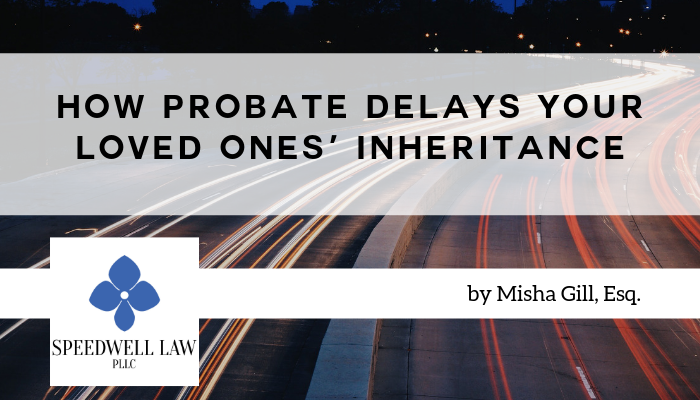
How Probate Delays Your Loved Ones’ Inheritance
There are plenty of reasons why individuals working on their estate plan should focus on avoiding probate as much as possible, but perhaps the biggest reason is the amount of time it can take. There are many steps involved in the probate process, all of which are required to finalize the estate and transfer ownership of property on to living beneficiaries.
The amount of time it takes to close an estate varies widely depending on how many assets are included in the state, their value and any other complicating factors that exist in the estate. But one thing is consistent across the board with any estates that go through probate: a lack of proper planning can make the process long and drawn out, increasing the stress you experience in the wake of your loved one’s passing and delaying the distribution of inheritances to beneficiaries.
Here are just a few examples of some of the factors that can add to the delays that already naturally exist as part of the probate process:
- Number of beneficiaries: The more beneficiaries, the longer the estate will take to probate—especially if they do not live close to the court where the estate is being probated. It can take quite a bit of time to send documents back and forth between people, all of whom are located in different areas.
- Location of executor: If the estate executor does not live close to the probate court or the attorney’s office, this can also delay the probate process, especially if he or she is not technologically savvy or good with communication.
- Arguments among beneficiaries: If there’s any drama that exists among estate beneficiaries, it could potentially draw out the probate process. For example, a will contest could result in the probate proceeding remaining open for a very long period of time while that contest can be processed. While these will contests aren’t extremely common, they can have a significant impact on the probate process when they do occur.
- Estate taxes: If the estate is valuable enough that it will be subject to the estate tax, this will also add some time to the probate process. The estate cannot be closed until the IRS has sent an official closing letter. The state taxing authority will also need to send a closing letter, if the state collects taxes on the estate as well. After filing an estate tax return, it could take six to eight months to receive this communication from the IRS. This affects very few estates, but the ones it does affect will take a long time to probate if the decedent failed to take probate avoidance steps.
- Additional complications: Other complications associated with the estate or assets, such as interest in a family business, multiple investment and brokerage accounts and other types of accounts or assets of greater value, could all affect how long it takes for the probate process to complete.
By working with an experienced estate planning attorney, you can develop a probate avoidance strategy that will save your beneficiaries a lot of time and headache after your passing.
Follow the Speedwell Blog HERE.
Schedule Your Consultation with Our Alexandria Estate Planning Attorney
Misha Gill is an Alexandria estate planning attorney for his firm, Speedwell Law, PLLC. If you would like assistance in setting up your own will, living trust, and other estate planning documents, Misha can be reached at (703) 553-2577 or [email protected].
This post, including any of its contents or links, is not intended to provide you with legal advice. It provides personal perspectives on legal news and developments. Reading this post, leaving a comment, or communicating with its author by email or over the Internet does not create any attorney-client relationship.





